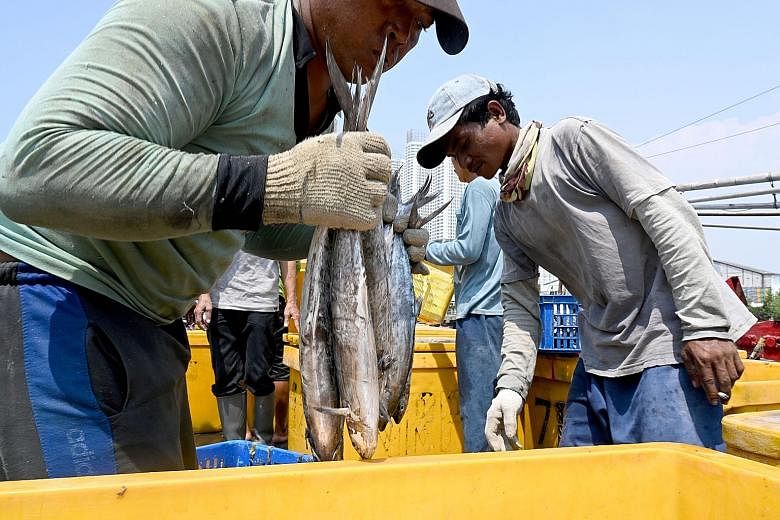JAKARTA • Enslaved, beaten, malnourished, and so desperate for water he had to collect condensation to drink, Mr Rahmatullah left Indonesia seeking better prospects at sea - instead he endured a living hell.
The global fishing industry is riddled with forced labour, anti-trafficking experts say, warning that consumers are unaware of the "true cost" of the seafood they buy in stores and restaurants.
Exploited workers face non-payment, overwork, violence, injury and even death. Indonesia and South-east Asia are major sources of such labour and unscrupulous brokers target the poor and uneducated with promises of good wages at sea.
Mr Rahmatullah was told he was heading to Peruvian waters where he would receive a US$400 (S$550) monthly salary, plus a per tonne bonus, but he was allegedly duped by an Indonesian recruiting agency and trafficked to Somalia, where he spent nine brutal months aboard a Chinese fishing vessel, working 18-hour days.
"I felt like a slave," the 24-year-old said, adding: "The Chinese crew drank clean water while we had to collect water from the air conditioning. We were often beaten when we didn't catch enough, even if we were sick."
Mr Rahmatullah is one of 40 Indonesians pushing for compensation after allegedly being tricked with false promises by recruiter PT Maritim Samudera.
Some were sent to vessels in the seas off Japan, and others to boats sailing the Somalian coast.
The men recounted beatings and psychological abuse, hunger and dehydration. Two crewmates died from thirst and exhaustion, according to Mr Rahmatullah. Most of the men subsisted on white rice scattered with cabbage or boiled fish.
Mobile phone videos and images showed some men slept without mattresses in a grimy cargo hold.
The young men spent between six and nine months manning nets and packing fish before being saved, and all are owed thousands of dollars in unpaid wages, according to sworn statements to police.
Faced with plummeting global fish stocks due to overfishing, seafood companies have increasingly turned to vulnerable migrant workers in a bid to remain profitable, anti-trafficking advocates said. "If you want cheap tuna or squid, the way to do it is with cheap labour," said Mr Arifsyah Nasution, oceans campaigner at Greenpeace Indonesia. "And cheap labour comes from South-east Asia."
But few shoppers know about these high-seas horrors. "There is still very little awareness among consumers about the true costs and hidden facts of the seafood products that they buy at stores and supermarkets," he said.
Critics say the Indonesian government is not doing enough to combat widespread abuse of its migrant sailors, despite efforts to clamp down on human rights violations in its own territorial waters.
Although there are no reliable estimates on the number of Indonesian migrant fishermen who have fallen victim to trafficking, the authorities estimated in 2016 that some 250,000 were working as "unprotected" crew on foreign fishing vessels. Most are destined for fishing fleets that often obscure their origins through foreign flagging, a system that complicates monitoring and jurisdictional oversight by allowing ships to register in a country other than the owner's own to avoid strict labour and environmental standards.
PT Maritim Samudera Indonesia, the company that recruited Mr Rahmatullah, was not legally registered to send people abroad and falsified documents for some workers, according to PPI, the union which is advocating on behalf of the 40 men.
Indonesia's Manpower Ministry has recommended that the men be compensated for their ordeal, but the recruiter has so far refused to pay, said the union.
AGENCE FRANCE-PRESSE

